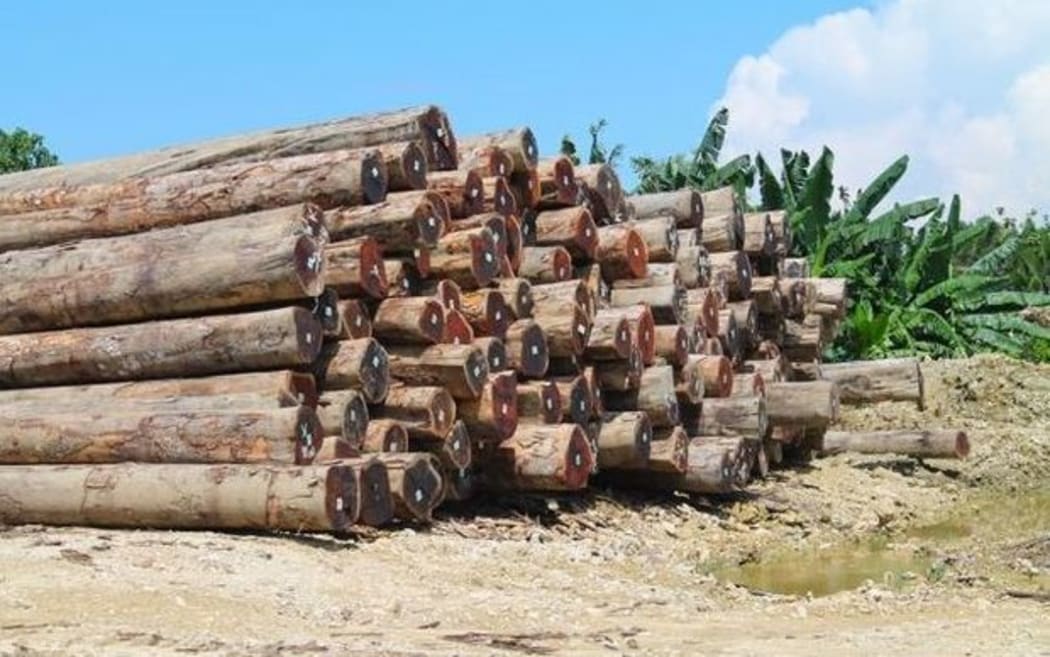The United Nations says the protection of tropical rainforests in Papua New Guinea is a global responsibility.
The comment was made by the UN Development Programme's resident representative in PNG during this week's celebration of world environment day.
Roy Trivedy says for people in PNG to prevent deforestation they need financial support from the rest of the world.
He told Ben Robinson Drawbridge about efforts to extend protected areas and threats to conservation in PNG.

Harvested logs in PNG
Photo: RNZI/Johnny Blades
Transcript
ROY TRIVEDY: It's a fascinating question. Around the world, what we are seeing, are a range of challenges to things like conservation movements in protected areas. One of those challenges is definitely population growth and there is a lot of emphasis now being put within government and non-governmental organisations about making sure there is good family planning. That Papua New Guinea is able to have population growth but make sure that people choose to have families by choice rather than chance. The other thing is of course, in many parts of the world, we are seeing huge amounts of economic growth which is unsustainable and basically undermines the possibility of protected areas and so on. So whether it is through mining, whether it is few different types of producer chains etcetera in particular sectors, it can definitely undermine some of these things. The third thing is of course deforestation and in Papua New Guinea we are also seeing some of the deforestation so there are definitely challenges. The trick, I think, to make this work - the idea of protected areas - is to ensure that communities see the benefit of this, that there are new jobs created which can ensure that communities are able to earn a decent livelihood. They are actually paid to protect areas, rather than to chop down forests and so on. So this is what the protected areas policy also talks about, how do you create new jobs, new livelihood opportunities against all over that challenges face.
BEN ROBINSON DRAWBRIDGE: Is that idea though dependent on tourism making that sort of protectionism self-sustaining?
RT: Forms of eco-tourism and so on, is definitely one part. You know there are not many countries in the world that have this type of possibility because the majority of industrialised countries of course have cut down their forests and so on but in Papua New Guinea we have currently about 30 per cent of 1.6 million hectares of terrestrial and marine life, established as protected areas. The aim is to grow this over the next few years. To reach the targets which the government has set for itself, the 17 per cent terrestrial area and 10 per cent marine area, will require a lot of new ways of working and part of it is also ensuring that global systems for better management of global resources are fully utilised to contribute money to communities at the grassroots, to protect areas and not chop them down. This is one of the things that UNDP is supporting the government with, is the REDD plus programme which is reducing emissions through deforestation and degradation by ensuring that global systems actually pay people and communities to manage their forests rather than chop them down. These things actually benefit the globe not just Papua New Guinea. Having intact forests, these are things which are actually a part of the global commons. It's a difficult argument of course when the pressures on land, on sea resources, are so enormous. Trying to establish these protected areas is not an easy task. It is no surprise that many countries have perhaps have tried this but have not succeeded completely. It is great that Papua New Guinea has that option and is still trying to do it and we have brought some of the world's leading world experts to be able to advise the Papua New Guinea government on its protected areas policy.
To embed this content on your own webpage, cut and paste the following:
See terms of use.


